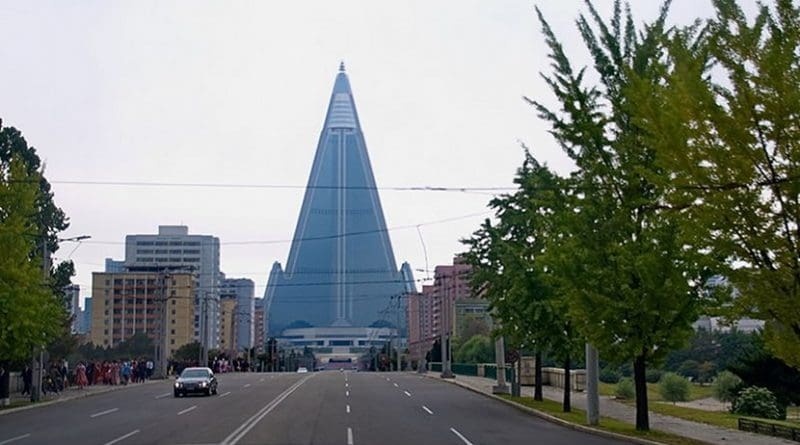Nuclear Axis Between North Korea And India – OpEd
Notwithstanding North Korea’s nuclear belligerence towards the United States, India is among a limited number of countries which have long-term strong relations with Pyongyang. In 2018, India shocked the world by the news that it sent a junior foreign minister, V K Singh, to North Korea. It was the first visit in 20 years by a senior Indian officer to North Korea, even as both countries maintained diplomatic relations in the past decades through backchannels diplomacy. International affairs and political analysts claimed that Singh’s travel to North Korea was no spontaneous diplomatic extension into the communist country but a part of the continuing initiative of New Delhi to establish a working connection with the isolated North Korea.
With nukes between 25 and 60, as per U.S. intelligence assessments, North Korea poses a major security threat to the US mainland and its allies in Europe. Despite severe economic sanctions, one wonders, how North Korean scientists learned sophistication in Intercontinental Ballistic Missile (ICBM) capabilities? A UN Panel of Experts (UN PoE) report published in February 2020, establish under UNSCR 1874 (2009), has revealed that a number of North Korean Scientists who are part of Pyongyang’s nuclear program, studied courses on space science and satellite technology at a research institute, Centre for Space Science and Technology Education in Asia and the Pacific (CSSTEAP), in northern India. According to the UN report, between 1995 and 2016, 30 North Korean students have studied courses on space science and satellite technology CSSTEAP in northern India.
CSSTEAP, which is located in Dehradun, the capital city of the state of Uttarakhand, offers extensive courses on Satellite Communications, Space & Atmospheric Science, Global Navigation Satellite Systems and many other disciplines related to space exploration. The Centre is hosted by the Government of India with the Department of Space (DOS), as the nodal agency. In an interview with Al Jazeera, Hong Yong-il, who studied at CSSTEAP, now Korean embassy’s new first secretary to India, praised center for educational courses. Interestingly, UN PoE report notes that “(Participation) in the space and atmospheric science and global navigation satellite systems courses is a ballistic missile-related activity prohibited under the resolutions.”
The UN PoE report indicates that New Delhi has violated UN Security Council’s unanimously adopted resolution 1718 (2006), which prohibited the provision of large-scale arms, nuclear technology and related training to North Korea. It is an open secret that India shares an unholy nuclear connection with North Korea, and quite surprisingly this is a lost debate in mainstream scholarship on the nuclear crisis in Korean Peninsula. India’s facilitation of Korean students remains a mystery despite UN PoE reports and subsequent investigative report by Al Jazeera titled as “India’s embarrassing North Korean connection,” in June 2016.
When UN officials raised objections on courses offering satellite communications training and instructions for launch vehicle testing to North Koreans,” India stopped accepting North Korean students. It means the courses offered to North Koreans were not that simple as India claimed. Once exposed by the UN PoE, India’s immediate rejection to North Korean students also substantiate UN official’s concerns. Subsequent events suggest that India is not clean regarding its nuclear connection with Pyongyang. Paek Chong-ho, who studied satellite communications training and instructions for launch vehicle testing at CSSTEAP, was appointed at a senior post in the agency governing North Korea’s 2012 satellite launch. All these evidence by UN officials report not just remove mysterious clouds from New Delhi’s clandestine relations with Pyongyang but also put a question mark on India’s nuclear nonproliferation commitments.
India helped and trained North Korean students, and it has been acknowledged by various experts focusing North Korea’s nuclear affairs. Bruce Bechtol, president of the International Council on Korean Studies in an email conversation stated that the “courses offered to North Korean students at CSSTEAP might very well have helped Pyongyang’s military programmes,” In another violation of UN sanctions, North Korea illegally exported coal, iron and other commodities worth US $270 million to India and some other countries. According to the UN experts, between October 2016 and May 2017, North Korea exported iron and steel products valued at US $305,713 to India and many other countries. Additionally, India also imported silver, copper, zinc, nickel, and gold from the DPRK which is a violation of UNSC sanction. This clandestine import-export relationship between India and North Korea enabled later to sustain a costly nuclear program.
But more worrisomely, a cybersecurity firm, Recorded Future, found intense North Korean internet activity in India where nearly one-fifth of North Korea’s cyber-attacks originate. Even, researchers believe that hackers from North Korea are physically stationed in India and consistently hacking the US and other European cities. It is an open secret that, for several years, after UNSC sanctions, India and North Korea have maintained a strong trading partnership. Quite surprisingly, when UNSC sanctioned North Korea, the trade volume between both countries, barely US $100 in mid of 2000 suddenly shoots up to the US $1 billion in 2009. The trade which overwhelmingly favors India makes it the second largest trade partner to North Korea. That means, in return for nuclear cooperation, there is an economic incentive for India. That’s why India calls its relationship with North Korea as the relationship of ‘friendship, cooperation, and understanding.
It’s essential for the international community to seek investigations into India’s nuclear linkages with North Korea. Through a comprehensive investigation process, those who are responsible can be held accountable for extending nuclear assistance to a rogue state which poses a greater security risk for the entire world.
*Syed Zain Jaffery is a student of Current Affairs and Political Science with Masters degree from NUST, Islamabad.


Made no sense at all. Just speculation.
Needs more supportand evidence to the writeup. Appears more of a fantasy than truth